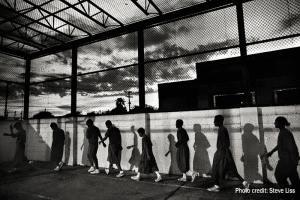In a news analysis piece for Truthout, journalist Victoria Law profiles a young man, DeAngelo Cortijo, who was detained in a California juvenile prison beginning at age 11. The article describes Cortijo's horrifying experience of being detained in solitary confinement for seven and a half months straight when he was 17 years old. As California and other states continue the fight to limit solitary confinement for youth like Cortijo, prison reform advocates across the nation are referencing the ACLU of Illinois lawsuit, RJ v. Jones, that brought about the end of solitary confinement for youth detained in Illinois Department of Juvenile Justice facilities. The new policies reached through a settlement agreement in the case prohibit the use of solitary confinement as a means of punishment, and require youth who are in solitary confinement for 24 hours or more to spend eight hours per day out of their cell. Law spoke with ACLU of Illinois senior staff counsel Adam Schwartz, who was the lead attorney in the case, about the conditions in Illinois' juvenile justice facilities at the time the case was filed:
Four years ago, Schwartz explained, youth confined by the Illinois Department of Juvenile Justice were placed in isolation for days - or in some cases, weeks - at a time. They had no contact with other people. They were deprived of education, mental health services and, often, even something to read. The isolation induces further anxiety, depression and post-traumatic stress disorder. "It's fundamentally counter-therapeutic and destructive," he said. Moreover, solitary confinement was often used as a form of punishment.
Read the article.


